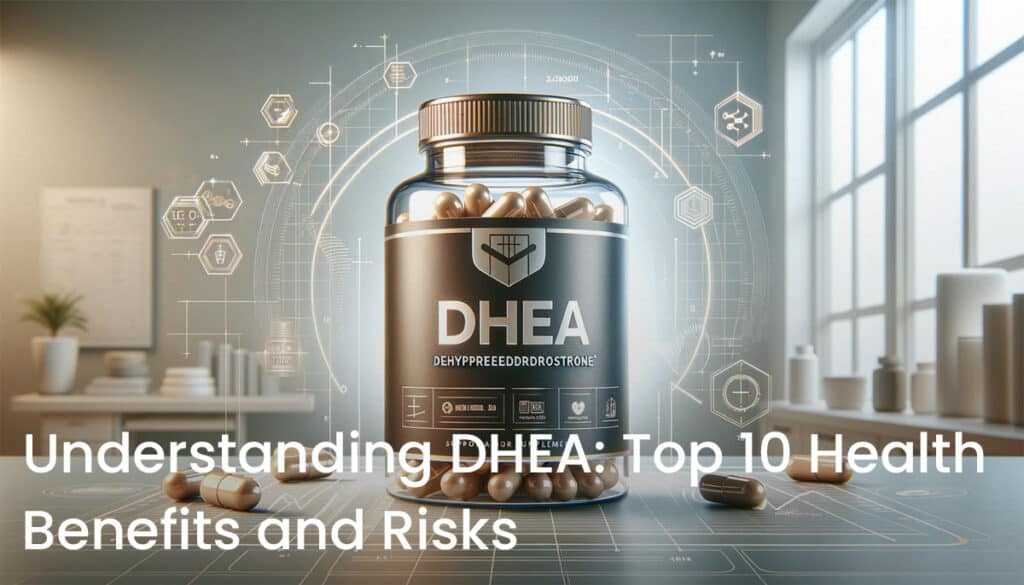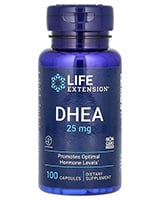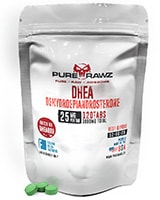

Introduction
Dehydroepiandrosterone, commonly known as DHEA, is a hormone that plays a crucial role in various bodily functions. As both a natural hormone and a dietary supplement, its significance in health and wellness has been a subject of extensive study and discussion. This article delves into the multifaceted world of DHEA, exploring its benefits and risks to provide a well-rounded understanding of its impact on health.
What is DHEA?
DHEA is a hormone produced by the adrenal glands, brain, and gonads. It serves as a precursor to male and female sex hormones, including testosterone and estrogen. Natural production of DHEA peaks in the mid-20s and gradually declines with age, leading to various health implications. While the body synthesizes DHEA naturally, it can also be made in labs from substances found in soy and wild yam. However, consuming these foods directly does not contribute to DHEA levels in the body.
Top 5 Health Benefits of DHEA
1. Enhancing Cognitive Functions
DHEA has shown promising effects in boosting cognitive abilities. Research indicates that it may improve memory, concentration, and executive functions, particularly in older adults[1]Malouf, R., Huppert, F. A., Van Niekerk, J. K., & Cochrane Dementia and Cognitive Improvement Group. (2006). Dehydroepiandrosterone (DHEA) supplementation for cognitive function in healthy elderly people. Cochrane Database of Systematic Reviews, 2006(4), CD006221. https://doi.org/10.1002/14651858.CD006221. By supporting brain health, DHEA supplementation could potentially aid in maintaining mental agility and reducing cognitive decline associated with aging.
2. Mood Improvement and Mental Health
DHEA supplementation has been linked to mood enhancement and potential benefits in mental health. Studies suggest that it can be effective in combating symptoms of depression and elevating overall mood[2]Peixoto, C., Grande, A. J., Mallmann, M. B., Nardi, A. E., Cardoso, A., & Veras, A. B. (2018). Dehydroepiandrosterone (DHEA) for depression: A systematic review and meta-analysis. CNS & Neurological Disorders – Drug Targets, 17(9), 706-711. https://doi.org/10.2174/1871527317666180817153914, offering a natural alternative to traditional antidepressants for some individuals.
3. Support for Bone Density
DHEA plays a vital role in bone health, especially in postmenopausal women and older adults. Its supplementation has been associated with improved bone density, reducing the risk of osteoporosis and fractures[3]Yokomoto-Umakoshi, M., Umakoshi, H., Iwahashi, N., Matsuda, Y., Kaneko, H., Ogata, M., Ogawa, Y., Fukumoto, T., Terada, E., Nakano, Y., & Sakamoto, R. (2021). Protective role of DHEAS in age-related changes in bone mass and fracture risk. The Journal of Clinical Endocrinology & Metabolism, 106(11), e4580-e4592. https://doi.org/10.1210/clinem/dgab459. By maintaining healthier bones, DHEA can contribute significantly to the overall quality of life in the aging population.
4. Benefits for Skin Health
The hormone’s anti-aging effects extend to skin health as well. DHEA is believed to enhance skin hydration, thickness, and elasticity, reducing the appearance of aging[4]Baulieu, E. E., Thomas, G., Legrain, S., Lahlou, N., Roger, M., Debuire, B., Faucounau, V., Girard, L., Hervy, M. P., Latour, F., Leaud, M. C., Mokrane, A., Pitti-Ferrandi, H., Trivalle, C., de Lacharrière, O., Nouveau, S., Rakoto-Arison, B., Souberbielle, J. C., Raison, J., Le Bouc, Y., Raynaud, A., Girerd, X., & Forette, F. (2000). Dehydroepiandrosterone (DHEA), DHEA sulfate, and aging: Contribution of the DHEAge Study to a sociobiomedical issue. Proceedings of the National Academy of Sciences of the United States of America, 97(8), 4279–4284. https://doi.org/10.1073/pnas.97.8.4279. Its impact on skin health is particularly notable, making it a popular ingredient in anti-aging skincare products.
5. Sexual Health and Libido
DHEA has been observed to have a positive impact on sexual function and libido. This is particularly evident in older adults, where natural levels of sex hormones have declined. Supplementing with DHEA can lead to improved sexual health and an increase in sexual desire[5]Peixoto, C., Carrilho, C. G., Barros, J. A., Ribeiro, T. T. S. B., Silva, L. M., Nardi, A. E., Cardoso, A., & Veras, A. B. (2017). The effects of dehydroepiandrosterone on sexual function: A systematic review. Climacteric, 20(2), 129–137. https://doi.org/10.1080/13697137.2017.1279141, enhancing overall well-being.
Top 5 Risks and Side Effects of DHEA
1. Hormonal Imbalance
DHEA can potentially disrupt the delicate balance of hormones in the body[6]Morales, A. J., Haubrich, R. H., Hwang, J. Y., Asakura, H., & Yen, S. S. (1998). The effect of six months treatment with a 100 mg daily dose of dehydroepiandrosterone (DHEA) on circulating sex steroids, body composition and muscle strength in age-advanced men and women. Clinical Endocrinology, 49(4), 421–432. https://doi.org/10.1046/j.1365-2265.1998.00507.x. Excessive use may lead to elevated levels of testosterone and estrogen, resulting in various side effects. Women, in particular, may experience changes in menstrual cycles, facial hair growth, and other symptoms indicative of hormonal imbalance.
2. Increased Risk of Certain Cancers
Due to its role in influencing hormone levels, there is concern that DHEA might increase the risk of hormone-sensitive cancers such as breast[7]Tang, J., Chen, L.-R., & Chen, K.-H. (2021). The utilization of dehydroepiandrosterone as a sexual hormone precursor in premenopausal and postmenopausal women: An overview. Pharmaceuticals, 15(1), 46. https://doi.org/10.3390/ph15010046, ovarian, and prostate cancer. While definitive evidence is lacking, the potential risk underscores the need for caution and medical supervision when considering DHEA supplementation.
3. Cardiovascular Risks
DHEA’s impact on heart health is complex and not entirely understood. Some studies suggest that DHEA might lower levels of HDL (good) cholesterol[8]Srinivasan, M., Irving, B. A., Dhatariya, K., Klaus, K. A., Hartman, S. J., McConnell, J. P., & Nair, K. S. (2009). Effect of Dehydroepiandrosterone Replacement on Lipoprotein Profile in Hypoadrenal Women. The Journal of Clinical Endocrinology & Metabolism, 94(3), 761–764. https://doi.org/10.1210/jc.2008-1774, potentially leading to increased cardiovascular risks. However, research in this area remains inconclusive, with conflicting results across different studies.
4. Psychological Effects
In addition to physical side effects, DHEA may also have psychological impacts[9]Dutheil, F., de Saint Vincent, S., Pereira, B., Schmidt, J., Moustafa, F., Charkhabi, M., Bouillon-Minois, J.-B., & Clinchamps, M. (2021). DHEA as a biomarker of stress: A systematic review and meta-analysis. Frontiers in Psychiatry, 12, 688367. https://doi.org/10.3389/fpsyt.2021.688367. Some individuals report experiencing anxiety, mood swings, and other mental health issues while taking DHEA supplements. These effects highlight the importance of monitoring and managing mental health when using DHEA.
5. Other Physical Side Effects
Other reported side effects of DHEA supplementation include acne, hair loss, high blood pressure, and breast growth in men. These effects can vary widely among individuals, depending on factors such as dosage, duration of use, and individual sensitivity to the hormone.
DHEA in Sports and Fitness
DHEA has gained attention in the realm of sports and fitness for its potential to enhance muscle mass and athletic performance. Athletes and bodybuilders sometimes use DHEA to boost androgen levels, which can theoretically improve muscle strength and endurance. However, its effectiveness in this regard remains controversial. Notably, DHEA use is banned by major sports organizations like the NCAA, NFL, and the International Olympic Committee, as it is considered a performance-enhancing drug. This regulation reflects concerns about the fair use of supplements in competitive sports and the potential health risks associated with unsupervised DHEA use.
DHEA and Aging
The link between DHEA and aging is a significant area of interest, with the hormone often being touted as an anti-aging supplement. The natural decline of DHEA production in the body as one ages has led to theories about its role in the aging process. Some studies suggest that DHEA supplementation might help mitigate age-related issues like bone density loss, skin health deterioration, and decreased libido. However, the overall effectiveness of DHEA as an anti-aging treatment remains a subject of debate within the scientific community, with ongoing research seeking to clarify its role and benefits in the context of aging.
Medical and Therapeutic Uses of DHEA
DHEA is not just a supplement for general well-being; it has specific medical and therapeutic applications. It has been studied for use in conditions like lupus, adrenal insufficiency, depression, and erectile dysfunction. In the case of lupus, DHEA may help improve the quality of life and reduce the frequency of flare-ups. For individuals with adrenal insufficiency, DHEA supplementation can lead to improved mood and energy levels. However, the effectiveness of DHEA in these conditions varies, and more research is needed to fully understand its therapeutic potential.
How to Use DHEA Safely
The key to harnessing the benefits of DHEA while minimizing risks lies in its safe usage. It is crucial to consult with a healthcare provider before starting DHEA supplements, especially for individuals with pre-existing health conditions. Dosage recommendations vary, but starting with the lowest possible dose to gauge tolerance is generally advised. Regular monitoring and adjustment by a healthcare professional can help mitigate potential side effects. Additionally, choosing high-quality DHEA supplements from reputable sources is vital, as the market is flooded with products of varying purity and potency.
DHEA: The Controversy and Research
The use of DHEA supplements remains a topic of considerable debate in the medical community. On one hand, there is evidence supporting its potential benefits in enhancing cognitive function, mood, and physical health. On the other, concerns about its safety, long-term effects, and the possibility of serious side effects like cancer and cardiovascular issues persist. Current research is ongoing and aims to provide more definitive answers regarding DHEA’s efficacy and safety. As with many supplements, the balance of risks and benefits of DHEA may vary greatly among individuals, and what works for one person may not be suitable for another.
Conclusion
DHEA, a naturally occurring hormone that diminishes with age, presents both potential health benefits and risks. Its role in enhancing cognitive function, mood, and physical health is countered by concerns about hormonal imbalance, increased cancer risk, and other side effects. The key to using DHEA safely lies in understanding these risks, consulting healthcare professionals, and approaching its use with informed caution. As research continues to evolve, so too will our understanding of DHEA, its role in health and aging, and its place in therapeutic and wellness strategies.
Buy DHEA Online Review Comparison Table
| Product | Company | Quantity | Price | Country | Website |
 DHEA | iHerb | 100 pills (25 mg) | $12.00 |  Worldwide, US, AU | Visit Website >> |
 DHEA | PureRawz | 120 pills (25 mg) | $32.48 |  Worldwide, US, AU | Visit Website >> |
References
| ↑1 | Malouf, R., Huppert, F. A., Van Niekerk, J. K., & Cochrane Dementia and Cognitive Improvement Group. (2006). Dehydroepiandrosterone (DHEA) supplementation for cognitive function in healthy elderly people. Cochrane Database of Systematic Reviews, 2006(4), CD006221. https://doi.org/10.1002/14651858.CD006221 |
|---|---|
| ↑2 | Peixoto, C., Grande, A. J., Mallmann, M. B., Nardi, A. E., Cardoso, A., & Veras, A. B. (2018). Dehydroepiandrosterone (DHEA) for depression: A systematic review and meta-analysis. CNS & Neurological Disorders – Drug Targets, 17(9), 706-711. https://doi.org/10.2174/1871527317666180817153914 |
| ↑3 | Yokomoto-Umakoshi, M., Umakoshi, H., Iwahashi, N., Matsuda, Y., Kaneko, H., Ogata, M., Ogawa, Y., Fukumoto, T., Terada, E., Nakano, Y., & Sakamoto, R. (2021). Protective role of DHEAS in age-related changes in bone mass and fracture risk. The Journal of Clinical Endocrinology & Metabolism, 106(11), e4580-e4592. https://doi.org/10.1210/clinem/dgab459 |
| ↑4 | Baulieu, E. E., Thomas, G., Legrain, S., Lahlou, N., Roger, M., Debuire, B., Faucounau, V., Girard, L., Hervy, M. P., Latour, F., Leaud, M. C., Mokrane, A., Pitti-Ferrandi, H., Trivalle, C., de Lacharrière, O., Nouveau, S., Rakoto-Arison, B., Souberbielle, J. C., Raison, J., Le Bouc, Y., Raynaud, A., Girerd, X., & Forette, F. (2000). Dehydroepiandrosterone (DHEA), DHEA sulfate, and aging: Contribution of the DHEAge Study to a sociobiomedical issue. Proceedings of the National Academy of Sciences of the United States of America, 97(8), 4279–4284. https://doi.org/10.1073/pnas.97.8.4279 |
| ↑5 | Peixoto, C., Carrilho, C. G., Barros, J. A., Ribeiro, T. T. S. B., Silva, L. M., Nardi, A. E., Cardoso, A., & Veras, A. B. (2017). The effects of dehydroepiandrosterone on sexual function: A systematic review. Climacteric, 20(2), 129–137. https://doi.org/10.1080/13697137.2017.1279141 |
| ↑6 | Morales, A. J., Haubrich, R. H., Hwang, J. Y., Asakura, H., & Yen, S. S. (1998). The effect of six months treatment with a 100 mg daily dose of dehydroepiandrosterone (DHEA) on circulating sex steroids, body composition and muscle strength in age-advanced men and women. Clinical Endocrinology, 49(4), 421–432. https://doi.org/10.1046/j.1365-2265.1998.00507.x |
| ↑7 | Tang, J., Chen, L.-R., & Chen, K.-H. (2021). The utilization of dehydroepiandrosterone as a sexual hormone precursor in premenopausal and postmenopausal women: An overview. Pharmaceuticals, 15(1), 46. https://doi.org/10.3390/ph15010046 |
| ↑8 | Srinivasan, M., Irving, B. A., Dhatariya, K., Klaus, K. A., Hartman, S. J., McConnell, J. P., & Nair, K. S. (2009). Effect of Dehydroepiandrosterone Replacement on Lipoprotein Profile in Hypoadrenal Women. The Journal of Clinical Endocrinology & Metabolism, 94(3), 761–764. https://doi.org/10.1210/jc.2008-1774 |
| ↑9 | Dutheil, F., de Saint Vincent, S., Pereira, B., Schmidt, J., Moustafa, F., Charkhabi, M., Bouillon-Minois, J.-B., & Clinchamps, M. (2021). DHEA as a biomarker of stress: A systematic review and meta-analysis. Frontiers in Psychiatry, 12, 688367. https://doi.org/10.3389/fpsyt.2021.688367 |

Leave a Reply